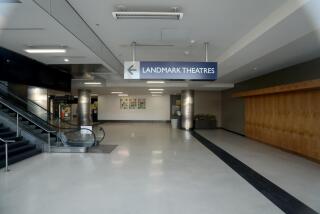Progress Amid Growing Need
- Share via
The largest comprehensive AIDS service center in the nation will be dedicated Thursday by AIDS Project Los Angeles. It marks an impressive step in meeting current needs in the pandemic of the human immune deficiency virus (HIV), but it also serves as a stark reminder of how much more must be done to meet future needs.
The Nancy Cole Sawaya Center is at 6721 Romaine St., near the intersection of Highland and Santa Monica, near the epicenter of the epidemic. It brings together under one roof and in 40,000 square feet of operating space all of the services of APLA with two exceptions: The dental clinic will remain at West Hollywood Park, and Our House, in the Pico-Union District, will continue as a separate residential facility. Among the services available at the Sawaya Center are case management, transportation to help clients to medical appointments, insurance counseling, food and clothing supplies, mental-health services, including special help in dealing with sexual compulsions and substance abuse, group therapy and professional training to help health-care providers protect themselves from AIDS.
Two of the most effective programs of APLA, the telephone hot line and the buddy program, also are operating from the new facility. They demonstrate the crucial role that volunteers can play in providing critical services. About 300 AIDS patients now have volunteer buddies to give them support, and about 200 volunteers staff the hot line, (800) 922-AIDS.
But the fine new APLA facilities and the agency’s effective program of services mask serious problems. Even in San Francisco, which established national norms for effective and affordable AIDS care, community-based programs are imperiled by the exhaustion of federal service demonstration project funding and by the budget paralysis created in Sacramento by Gov. George Deukmejian’s proposals to cut funds for the medically indigent. Federal and state funding are not keeping up with demand. And, to make matters worse, private donations have leveled off. And so has the supply of volunteers.
APLA is a microcosm of the national crisis in AIDS services. The agency has just emerged from a radical reorganization; it was forced to trim three dozen people from the professional staff as programs outgrew support. With a vigorous and experienced new chief executive officer, Stephen Bennett, and with better focused and somewhat reduced goals, it is making a fresh start. With a paid staff of 100 and 1,500 volunteers, it has a client load of 1,900, or more than half the AIDS-diagnosed people of the county. But its $8.1-million budget is by no means assured because of the uncertainty of government funding, which covers 30% of the budget, and fluctuations in voluntary contributions.
“With donor dollars, we can create models and create solutions, models for government support,” Bennett said the other day. “But, long term, the funding has to be federal.”
Even within APLA, however, progress is coming slowly. Our House, the residential facility serving AIDS and ARC patients who also have psychological or substance abuse problems, is operating at its capacity of 14, with a waiting list of 17. The buddy program needs 80 additional volunteers to eliminate a waiting list. Most volunteers are drawn from the gay community, but one of the most effective buddies is a housewife with teen-age children of her own, now working with her fourth “buddy.” The hot line, which processes as many as 5,000 calls a month, 75% of them from heterosexual persons, also needs additional volunteers.
The dedication will be the occasion for satisfaction, and also for reflection. There are signs of a diminished public response to the disease, and of a reduced concern in government, at the very moment when preparations for the increasing caseload of the next few years are of special importance. Programs are weakest among blacks, Latinos and intravenous drug users, the very populations where the risk of rapid spread is greatest. There is, in effect, a nagging doubt that there will be a continuation of the kind of generous financial and participatory support given APLA by Nancy Cole Sawaya, for whom the center is named. She will be represented by her husband at the dedication. She died in 1986 of an AIDS-related illness.
More to Read
Sign up for Essential California
The most important California stories and recommendations in your inbox every morning.
You may occasionally receive promotional content from the Los Angeles Times.













